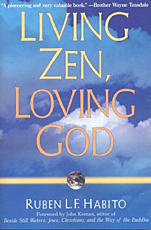One of the many salutary developments of the growing multifaith movement is the bridges that have been built between different wisdom traditions. Ruben L. F. Habito served as a Jesuit priest in Japan under the guidance of the great spiritual pioneer Father Hugo Enomiya-Lassalle and studied Zen with the renowned teacher Koun Yamada. This native of the Philippines is a prominent figure in the ongoing Buddhist-Christian dialogue. He joins the company of other Catholics who have explored the riches of the Zen tradition including Elaine MacInnes (Light Sitting in Light: A Christian's Experience of Zen), Robert Kennedy (Zen Gifts to Christians), and Tom Chetwynd (Zen and the Kingdom of Heaven: Reflections on the Tradition of Meditation in Christianity and Zen Buddhism).
In this erudite collection of essays, Habito describes his experience of living Zen and loving God as one of "mutual indwelling." Now a professor in the School of Theology at Southern Methodist University, he begins by discussing the fact that both Christianity and Zen invite us "to set aside our recipe books or menus, and simply 'taste and see' for ourselves." In a chapter on emptiness, Habito salutes the Zen practice of emptiness, the letting go of one's attachments, false self-images, and discriminating thoughts. He also explains the meaning and significance of the Heart Sutra, the four vows of the Bodhissatva, and several Zen koans. The liberating wisdom here can be received whole-heartedly by a Christian: "And so the ultimate fruit of Zen is nothing more, and nothing less, than becoming truly what one is: truly human, whole, at peace, at one with everything, yet emptied of everything."
In a wonderful chapter, Habito offers a Zen reading of the parable of the Good Samaritan whereby the one who reaches out to help the stranger in need is a person who has set aside the dualism of self versus the world and learned how to experience another's pain as his own. Zen practice, according to the author, does not lead to an abandonment of the world but to a deeper engagement with its pain, anguish, suffering, and woes.
